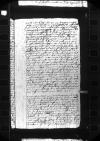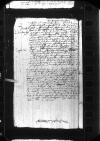Von weg(en) der alten freuntschafft wisse wir mit unsern(n) briven(n) zu nymants, dan zu Ew(e)r Herligheit, / der zuvorsicht, sich nicht werde besveren / zu befhelen den(n) iren solche brive zu antwurtn(n) und furdren, do hin sie gehoren(n). / Der wegen wir E(wer) H(erlighei)t vil schuldig und pflichtig wollenn superinscribed in place of crossed-out ...⌈... illegible⌈...... illegible⌉wollen(n)wollenn superinscribed in place of crossed-out ...⌉ sein, / gancz gewilliger solchs umb E(wer) H(erlighei)t widerum(m)b freuntlich zu beschulden. / Ouch wolte wir E(wer) H(erlighei)t nicht bergen, / das, so wir negst im Diet of Poland ⌊reichstage der Kron PolenDiet of Poland ⌋ zu Cracow (Kraków, Cracovia), city in southern Poland, Małopolska, on the Vistula river, from 1038 capital of the Kingdom of Poland⌊KrakoCracow (Kraków, Cracovia), city in southern Poland, Małopolska, on the Vistula river, from 1038 capital of the Kingdom of Poland⌋ gewest / und superinscribed in place of crossed-out ...⌈... illegible⌈...... illegible⌉undund superinscribed in place of crossed-out ...⌉ uns von viler woltath wegen uns von E(wer) H(erlighei)t bewisen, / Georg Hegel (†1547), the Thurzons' and later the Fuggers' factor in Cracow (worked for the Fuggers at least from 1521); supplier to the royal court in Cracow (PSB 9, p. 336)⌊Jorg(en) HegelGeorg Hegel (†1547), the Thurzons' and later the Fuggers' factor in Cracow (worked for the Fuggers at least from 1521); supplier to the royal court in Cracow (PSB 9, p. 336)⌋, E(wer) H(erlighei)t diner  AAWO, AB, D. 7, f. 38v erboten(n), / so was wer bey ko(nigliche)r m(ajeste)t und den h(e)rn superinscribed⌈bey Sigismund I Jagiellon (Zygmunt I) (*1467 – †1548), King of Poland and Grand Duke of Lithuania (1506-1548); Duke of Głogów (Glogau) (1499-1506), Duke of Opava (1501-1506), Governor of Silesia (1504-1506); son of King Kazimierz IV Jagiellon and Elisabeth of Austria⌊ko(nigliche)r m(ajeste)tSigismund I Jagiellon (Zygmunt I) (*1467 – †1548), King of Poland and Grand Duke of Lithuania (1506-1548); Duke of Głogów (Glogau) (1499-1506), Duke of Opava (1501-1506), Governor of Silesia (1504-1506); son of King Kazimierz IV Jagiellon and Elisabeth of Austria⌋ und den h(e)rnbey ko(nigliche)r m(ajeste)t und den h(e)rn superinscribed⌉ zu thun, E(wer) H(erlighei)t und den iren(n) [...] hidden by binding⌈[...][...] hidden by binding⌉ guth(en), / uns sold ansprechn(n) etc. Do nebn(n) uns ouch ane [...] hidden by binding⌈[...][...] hidden by binding⌉ sverheit on the margin⌈sverheitsverheit on the margin⌉ solde ankomen(n), / wan solchs von noten(n) in die [...] hidden by binding⌈[...][...] hidden by binding⌉ und zu Sigismund I Jagiellon (Zygmunt I) (*1467 – †1548), King of Poland and Grand Duke of Lithuania (1506-1548); Duke of Głogów (Glogau) (1499-1506), Duke of Opava (1501-1506), Governor of Silesia (1504-1506); son of King Kazimierz IV Jagiellon and Elisabeth of Austria⌊ko(nigliche)r m(ajeste)tSigismund I Jagiellon (Zygmunt I) (*1467 – †1548), King of Poland and Grand Duke of Lithuania (1506-1548); Duke of Głogów (Glogau) (1499-1506), Duke of Opava (1501-1506), Governor of Silesia (1504-1506); son of King Kazimierz IV Jagiellon and Elisabeth of Austria⌋ und andren h(e)rn on the margin⌈und andren h(e)rnund andren h(e)rn on the margin⌉ uns zu begebn(n), / Ew(e)r H(erlighei)t beste [...] hidden by binding⌈[...][...] hidden by binding⌉ schaffen und furdren(n), / in welchen(n) erbittn(n) w[...] hidden by binding⌈[...][...] hidden by binding⌉ beharren(n) / und Got geb, das superinscribed⌈dasdas superinscribed⌉ es num(m)er not sey, de[...] hidden by binding⌈[...][...] hidden by binding⌉ so genczlich nochkomen(n) wollen(n). / Das sol sich E(wer) H(erlighei)t vortraulich zu uns vorsehen, / dan der selbt(en) E(wer) H(erlighei)t vil liebs und freuntlichs diensts mit der ta[...] hidden by binding⌈[...][...] hidden by binding⌉ zu erczeg(en), / sey wir schuldig und willig. / Es hidden by binding⌈[s]s hidden by binding⌉ hot uns ouch nicht wenig mher alse zuvor Georg Hegel (†1547), the Thurzons' and later the Fuggers' factor in Cracow (worked for the Fuggers at least from 1521); supplier to the royal court in Cracow (PSB 9, p. 336)⌊Jorg HegelGeorg Hegel (†1547), the Thurzons' and later the Fuggers' factor in Cracow (worked for the Fuggers at least from 1521); supplier to the royal court in Cracow (PSB 9, p. 336)⌋, E(wer) H(erlighei)t negst zu Krako on the margin⌈negst zu Cracow (Kraków, Cracovia), city in southern Poland, Małopolska, on the Vistula river, from 1038 capital of the Kingdom of Poland⌊KrakoCracow (Kraków, Cracovia), city in southern Poland, Małopolska, on the Vistula river, from 1038 capital of the Kingdom of Poland⌋negst zu Krako on the margin⌉ verpflicht gemacht, uns superinscribed⌈unsuns superinscribed⌉ mit ... illegible⌈...... illegible⌉ einer [...] hidden by binding⌈[...][...] hidden by binding⌉chen sum(m)a gelts ... illegible⌈...... illegible⌉, die wir im dissen briv superinscribed in place of crossed-out diss mol⌈diss mol im dissen briv[...] hidden by binding⌈[...][...] hidden by binding⌉ im dissen briv superinscribed in place of crossed-out diss mol⌉ w[...] hidden by binding⌈[...][...] hidden by binding⌉ erlegen und zuschick(en), vorlegt, / do vor wir ouch hidden by binding⌈[ch]ch hidden by binding⌉ E(wer) H(erlighei)t fast grossen danck wissen und sag(en) / und hidden by binding⌈[nd]nd hidden by binding⌉ umb E(wer) H(erlighei)t zu beschulden nicht wollen under[...] hidden by binding⌈[...][...] hidden by binding⌉sen, / die wir Gothe in langwerig(e)r gesuntheit hidden by binding⌈[t]t hidden by binding⌉ und glukselig(en) zu nemen(n) befelen(n), / bittend unse[...] hidden by binding⌈[...][...] hidden by binding⌉ gunstiger freundt wolt sein und bleibn(n). /
AAWO, AB, D. 7, f. 38v erboten(n), / so was wer bey ko(nigliche)r m(ajeste)t und den h(e)rn superinscribed⌈bey Sigismund I Jagiellon (Zygmunt I) (*1467 – †1548), King of Poland and Grand Duke of Lithuania (1506-1548); Duke of Głogów (Glogau) (1499-1506), Duke of Opava (1501-1506), Governor of Silesia (1504-1506); son of King Kazimierz IV Jagiellon and Elisabeth of Austria⌊ko(nigliche)r m(ajeste)tSigismund I Jagiellon (Zygmunt I) (*1467 – †1548), King of Poland and Grand Duke of Lithuania (1506-1548); Duke of Głogów (Glogau) (1499-1506), Duke of Opava (1501-1506), Governor of Silesia (1504-1506); son of King Kazimierz IV Jagiellon and Elisabeth of Austria⌋ und den h(e)rnbey ko(nigliche)r m(ajeste)t und den h(e)rn superinscribed⌉ zu thun, E(wer) H(erlighei)t und den iren(n) [...] hidden by binding⌈[...][...] hidden by binding⌉ guth(en), / uns sold ansprechn(n) etc. Do nebn(n) uns ouch ane [...] hidden by binding⌈[...][...] hidden by binding⌉ sverheit on the margin⌈sverheitsverheit on the margin⌉ solde ankomen(n), / wan solchs von noten(n) in die [...] hidden by binding⌈[...][...] hidden by binding⌉ und zu Sigismund I Jagiellon (Zygmunt I) (*1467 – †1548), King of Poland and Grand Duke of Lithuania (1506-1548); Duke of Głogów (Glogau) (1499-1506), Duke of Opava (1501-1506), Governor of Silesia (1504-1506); son of King Kazimierz IV Jagiellon and Elisabeth of Austria⌊ko(nigliche)r m(ajeste)tSigismund I Jagiellon (Zygmunt I) (*1467 – †1548), King of Poland and Grand Duke of Lithuania (1506-1548); Duke of Głogów (Glogau) (1499-1506), Duke of Opava (1501-1506), Governor of Silesia (1504-1506); son of King Kazimierz IV Jagiellon and Elisabeth of Austria⌋ und andren h(e)rn on the margin⌈und andren h(e)rnund andren h(e)rn on the margin⌉ uns zu begebn(n), / Ew(e)r H(erlighei)t beste [...] hidden by binding⌈[...][...] hidden by binding⌉ schaffen und furdren(n), / in welchen(n) erbittn(n) w[...] hidden by binding⌈[...][...] hidden by binding⌉ beharren(n) / und Got geb, das superinscribed⌈dasdas superinscribed⌉ es num(m)er not sey, de[...] hidden by binding⌈[...][...] hidden by binding⌉ so genczlich nochkomen(n) wollen(n). / Das sol sich E(wer) H(erlighei)t vortraulich zu uns vorsehen, / dan der selbt(en) E(wer) H(erlighei)t vil liebs und freuntlichs diensts mit der ta[...] hidden by binding⌈[...][...] hidden by binding⌉ zu erczeg(en), / sey wir schuldig und willig. / Es hidden by binding⌈[s]s hidden by binding⌉ hot uns ouch nicht wenig mher alse zuvor Georg Hegel (†1547), the Thurzons' and later the Fuggers' factor in Cracow (worked for the Fuggers at least from 1521); supplier to the royal court in Cracow (PSB 9, p. 336)⌊Jorg HegelGeorg Hegel (†1547), the Thurzons' and later the Fuggers' factor in Cracow (worked for the Fuggers at least from 1521); supplier to the royal court in Cracow (PSB 9, p. 336)⌋, E(wer) H(erlighei)t negst zu Krako on the margin⌈negst zu Cracow (Kraków, Cracovia), city in southern Poland, Małopolska, on the Vistula river, from 1038 capital of the Kingdom of Poland⌊KrakoCracow (Kraków, Cracovia), city in southern Poland, Małopolska, on the Vistula river, from 1038 capital of the Kingdom of Poland⌋negst zu Krako on the margin⌉ verpflicht gemacht, uns superinscribed⌈unsuns superinscribed⌉ mit ... illegible⌈...... illegible⌉ einer [...] hidden by binding⌈[...][...] hidden by binding⌉chen sum(m)a gelts ... illegible⌈...... illegible⌉, die wir im dissen briv superinscribed in place of crossed-out diss mol⌈diss mol im dissen briv[...] hidden by binding⌈[...][...] hidden by binding⌉ im dissen briv superinscribed in place of crossed-out diss mol⌉ w[...] hidden by binding⌈[...][...] hidden by binding⌉ erlegen und zuschick(en), vorlegt, / do vor wir ouch hidden by binding⌈[ch]ch hidden by binding⌉ E(wer) H(erlighei)t fast grossen danck wissen und sag(en) / und hidden by binding⌈[nd]nd hidden by binding⌉ umb E(wer) H(erlighei)t zu beschulden nicht wollen under[...] hidden by binding⌈[...][...] hidden by binding⌉sen, / die wir Gothe in langwerig(e)r gesuntheit hidden by binding⌈[t]t hidden by binding⌉ und glukselig(en) zu nemen(n) befelen(n), / bittend unse[...] hidden by binding⌈[...][...] hidden by binding⌉ gunstiger freundt wolt sein und bleibn(n). /
 AAWO, AB, D. 7, f. 38v erboten(n), / so was wer bey ko(nigliche)r m(ajeste)t und den h(e)rn superinscribed⌈bey
AAWO, AB, D. 7, f. 38v erboten(n), / so was wer bey ko(nigliche)r m(ajeste)t und den h(e)rn superinscribed⌈bey 
